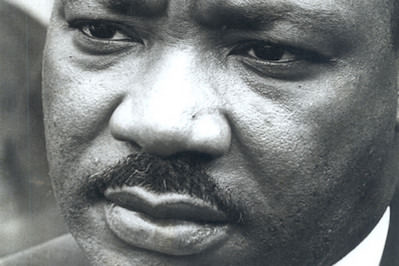Inheritors of MLK’s Legacy Are Drawn to the Revolutionary King
Many young black activists say they prefer the capitalism-challenging radical to the Nobel Prize-winning pacifist to whom they were introduced as children.
Martin Luther King Jr. (U.S. Embassy New Delhi / CC BY-ND 2.0)
Many young black activists say they prefer the radical Martin Luther King Jr. to the peacemaker to whom they were introduced as children.
“There is a Martin Luther King that is important to the resistance movement that we don’t hear about,” said 33-year-old Abdul Aliy-Muhammad, co-founder of the Black and Brown Workers Collective in Philadelphia. “We always hear about love and forgiveness. … There was also a King who was radical.”
Aliy-Muhammad was quoted in a story by The Associated Press on Jan. 14. The story continued:
Younger black activists say they prefer the pointed, more forceful King to the Nobel Prize-winning pacifist who preached love over hate as he led nonviolent marches across the segregated South. They like the fact that the urgency in King’s demand for equality in the years just before his assassination in 1968 is in keeping with the tenacious nature of today’s Black Lives Matter rallying cry.
“Then as now, it was about promises not translating into substantive transformation,” said Princeton University professor Imani Perry. “The questions young people are asking and the way they’re challenging the status quo are important. If we don’t have that kind of vision, we end the possibility for change before we even have the conversation. In that sense, they really are carrying the torch.”
Fifty years ago this month, King retreated to the Caribbean with his wife, Coretta, and a few friends to write his final book, “Where Do We Go From Here: Chaos or Community?” In the book, published in June 1967, King argued for racial equality for black Americans through the wholesale embrace of social and economic reform.
During the book’s promotional tour, King spoke out against the Vietnam War and criticized U.S. leaders for allowing slum conditions to persist in the cities. “Everyone is worrying about the long hot summer with its threat of riots. We had a long cold winter when little was done about the conditions that create riots,” King said in June 1967. Today’s young activists say King’s harsher words resonate just as much as his methods of peaceful protest.
“We do King a disservice when we try to tell a flat story of turning the other cheek,” said 31-year-old Charlene Carruthers, national director of the Black Youth Project 100 in Chicago. “It was never simply that.” …
Remembering King as a community organizer places his movement alongside contemporary activism, said Patrisse Cullors, co-founder of Black Lives Matter.
Read more here.
—Posted by Alexander Reed Kelly
Independent journalism is under threat and overshadowed by heavily funded mainstream media.
You can help level the playing field. Become a member.
Your tax-deductible contribution keeps us digging beneath the headlines to give you thought-provoking, investigative reporting and analysis that unearths what's really happening- without compromise.
Give today to support our courageous, independent journalists.






You need to be a supporter to comment.
There are currently no responses to this article.
Be the first to respond.